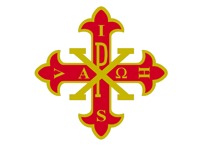 Palermo – December 5, 2014. As part of the cultural activities promoted by the Delegation of Sicily of the Sacred Military Constantinian Order of St. George, aimed at the knowledge of Sicilian history, on 05 December was held in the meeting room of the hotel Joli in Palermo a meeting to presentat the last book written by the historian and essayist Pasquale Hamel “THE LONG REIGN -The adventurous life of Frederick III King of Sicily”, Rubettino Publisher, the first book of the Series Studies and Research “The new Region”, promoted by the deputies of the Sicily Regional Assembly.
Palermo – December 5, 2014. As part of the cultural activities promoted by the Delegation of Sicily of the Sacred Military Constantinian Order of St. George, aimed at the knowledge of Sicilian history, on 05 December was held in the meeting room of the hotel Joli in Palermo a meeting to presentat the last book written by the historian and essayist Pasquale Hamel “THE LONG REIGN -The adventurous life of Frederick III King of Sicily”, Rubettino Publisher, the first book of the Series Studies and Research “The new Region”, promoted by the deputies of the Sicily Regional Assembly.
A curious and attentive audience was propelled into the medieval Sicilian climate ranging from 1296 to 1337, an important historical period for Sicily, but often understood and neglected by official historians.
Articulated speeches especially those of enthusiasts of Sicilian history such as that Knight dr. Baldassare Cacioppo, and noble dr. Antonio di Janni, Knight Gr. Cr. Grace, Delegate Vicar of Sicily of the Constantinian Order, in addition to the author’s speech prof. Pasquale Hamel, and the final one given by Prof. Francesca Paola Massara, professor of Christian Archaeology and Art History at the Pontifical Theological Faculty of Sicily “San Giovanni Evangelista”
The introduction to the work was edited by Cav. Cacioppo, who, through his intervention, enriched by illustrative slides, retraced the actions and constitutional reforms of this great man and great ruler “elected” by the Sicilian Parliament. He “primus inter pares” during his 41 years of government did of the independence and autonomy of the kingdom of Sicily, born with the Sicilian Vespers, his earthly mission, at the great price to fight against all.
During his speech he recalled the emeritus Constantinian Knight Prof. Corrado Mirto, university professor and one of the greatest scholars of medieval Sicily, author of two important historical reconstructions related to the great king of Sicily:: the identification of the tomb in the Catania’s Cathedral and the reconstruction of the flag of the Kingdom of Sicily .
The delegate Vicar of Sicily, dr. Antonio di Janni, promoter of the event and scholar of the history of the Kingdom of the Two Sicilies, after noting that the initiative aims to recover the medieval history, an historical period often forgotten or deliberately omitted, he outlined the figure and the charisma of the King of the Kingdom of Sicily, who always ruled with the consent and the fidelity of the Sicilian people.
In his speech he pointed out that the Aragonese dynasty, ito which belongs Frederick III, can boast a record in the Sicilian history, in fact the descendant Alfonso V the Magnanimous, already King of Sicily, after the victory over the Angevins and the conquest of the Kingdom of Naples, in 1441, he unifies the two Kingdoms and assumes the title of first King of the Two Sicilies.
The writer, prof. Hamel, in his passionate speech has highlighted the prestigious role of the Kingdom of Sicily in the Mediterranean area and the relations with the Latin Eastern Empire, Byzantine, with the Arabs and the Jews.
He closed his speech by pointing out that King Frederick III is a figure “on which it is loaded the management of the “after Vespers”, the victim of an ideological reading of the history of Sicily, who represented the idea of a Sicilian nation separated from the rest of the country that could hardly be accepted by the official historiography.
The prejudice has had a decisive influence on the reading of this historical period and of this King.
The Prof. Francesca Paola Massara, in his closing remarks gave the participants many important starting points for a critical reflection, consequential to the reading of the book, on” doing history “,” tell the story “,” make history.”.
She has also revealed the historical situation of this period in a parallel comparison with the testimonies of the material culture and the self-representation datas, highlighting the suffering of an island devastated by a century of wars and raids to which, even the conclusion with the War of the Vespers, did not bring a final and lasting peace. She continued her speech by praising the actions of the sovereign to support the Franciscan movement of pauperism and the expansion of the orders. Mendicant orders.
The work written by Hantel uses a simple and easy language which requires proper attention, and involves the reader, not only making him relive a glorious era of this beautiful Mediterranean island –Sicily- , thanks to the precise chronology of events conducted by this brave knight always ready with sword in hand to defend its autonomy and independence, bit also making us appreciate the human military and political qualities of a character that has meant that the Sicilians would feel proud to be sicilianis.
A character unknown to most people, “King Frederick III of Sicily “, but mentioned by Dante, in the third canto of the Divine Comedy, as “the honor of Cecilia and Aragon “.








